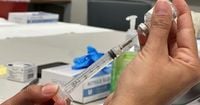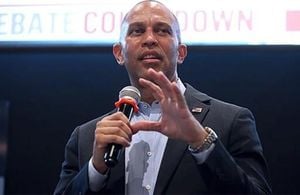On September 18, 2025, the landscape of childhood immunization policy in the United States shifted in a way not seen in years. After hours of debate, the federal vaccine advisory panel—now under the direct influence of U.S. Health Secretary Robert F. Kennedy Jr.—voted to restrict the use of the combination MMRV vaccine (measles, mumps, rubella, and varicella) for children under the age of four. Instead, the committee recommended that younger children receive separate MMR and chickenpox (varicella) vaccines, rather than the four-in-one shot that had become commonplace in pediatric care.
The vote was close: 8-3 in favor of the change, with one abstention. This marked the first major alteration to the routine childhood immunization schedule since Kennedy—long a controversial figure for his criticism of vaccines—took the helm at Health and Human Services. According to The Associated Press, the committee’s recommendations are typically adopted by the Centers for Disease Control and Prevention (CDC), shaping pediatricians’ practices and insurance coverage nationwide.
The Advisory Committee on Immunization Practices (ACIP) is the federal body responsible for guiding vaccine use across the country. Its decisions ripple outward, affecting not just CDC guidance but also the Vaccines for Children Program—a federal initiative that pays for roughly half of all childhood vaccines in the U.S.—as well as Medicaid and private insurance coverage. As WRAL reported, if ACIP votes to remove a vaccine from its recommended schedule, insurers often follow suit, potentially leaving families to shoulder hundreds of dollars in out-of-pocket costs for shots that were once free.
The committee’s discussion centered on a rare but well-documented side effect: feverish (febrile) seizures that occasionally occur 8 to 10 days after the MMRV vaccine is administered to children under four. While these seizures are typically harmless and unrelated to long-term brain function or learning, they can be alarming for families. Dr. Cody Meissner, a committee member, acknowledged, “Such seizures may be a very frightening experience,” but emphasized that “medical experts agree they’re not linked to brain function or school problems.”
Most children in the U.S. already receive separate MMR and varicella shots for their first dose—about 85%, according to CDC data presented at the meeting. Still, combination vaccines like MMRV have traditionally been praised for improving vaccination completion and timeliness, especially in communities where access to healthcare can be inconsistent. Dr. Richard Haupt, a vice president at Merck (the maker of the MMRV vaccine ProQuad), reminded the committee that “combination vaccines improve completion and on-time vaccination at a time when the nation is seeing a troubling decline in vaccination coverage.” He cautioned, “Any policy decision that compromises the clarity or consistency of vaccination guidance has the potential to further diminish public confidence.”
Yet, the panel was not swayed to keep the status quo. As WRAL noted, the board looked at studies—some more than a decade old—linking MMRV to higher rates of febrile seizures in young children, and ultimately decided that the risk, though rare, warranted a change in policy. Children under four will still be able to receive the protection of MMR and chickenpox vaccines, just not in the combined formulation.
The committee also voted 8-1, with three abstentions, to continue covering MMRV for children as young as 12 months under the Vaccines for Children program. This decision, however, left some members confused about how to align vaccine coverage with the new, more restrictive guidance. A federal official pointed out that other insurance programs, including Medicaid, might need to stop paying for the early combo dose, potentially complicating access for families who prefer the convenience of a single shot.
Beyond MMRV, the committee was poised for another contentious debate: whether to delay the hepatitis B vaccine that has been administered to virtually all newborns in the U.S. since 2005. The hepatitis B shot, first licensed in 1981, has been credited with reducing infant hepatitis B cases from 5,494 in 2005 to just 2,214 in 2023, according to CDC presenters. The vaccine is especially crucial for infants born to mothers with hepatitis B, as up to 90% of infected babies develop chronic infections if not immunized promptly.
Some committee members, however, questioned whether the blanket policy of vaccinating all newborns within 24 hours of birth was necessary. Dr. Evelyn Griffin asked, “Are we asking our babies to solve an adult problem?”—a sentiment reflecting growing unease about informed consent and parental autonomy in medical decision-making. Dr. Meissner, in contrast, argued, “This is an absolutely safe vaccine. I’m not sure what we’re gaining by avoiding that first dose within 12 to 24 hours after birth.” He warned, “We will be creating new doubts in the mind of the public that are not justified.”
Public commentators echoed the confusion. Dr. Flor Munoz-Rivas, representing the Infectious Diseases Society of America, pressed the committee: “Why? Why are we addressing this hepatitis B vaccine recommendation? Is there really a reason that the committee can provide for making a change?” Committee member Dr. Robert Malone responded, “The signal that is prompting this is not one of safety. It’s one of trust. And it’s one of parents uncomfortable with this medical procedure being performed at birth in a rather unilateral fashion without significant informed consent.”
The meeting’s timing and composition were themselves unusual. As WRAL reported, the ACIP meeting, typically scheduled for June, was delayed after Secretary Kennedy abruptly dismissed all 17 previous committee members, citing conflicts of interest. Kennedy justified the move by claiming that 97% of the committee had such conflicts, though Journal of American Medicine research published in August disputed this, finding the panel’s conflicts of interest were at their lowest in years.
In his opening remarks, committee chairman Martin Kulldorff sought to address critics who accused the new panel of harboring anti-vaccine sympathies. “The members of this ACIP Committee are committed to reassuring the public and restoring public confidence by removing unnecessary risks and harms whenever possible. That is a pro-vaccine agenda,” he asserted. Kulldorff also welcomed “scientific critique of any of our votes, as there are gray areas due to incomplete scientific knowledge.”
The committee’s work is not finished. On September 19, the panel is set to tackle recommendations for COVID-19 vaccines. According to The Associated Press, these deliberations will weigh who should be eligible for the latest shots this fall, with insurance coverage and public access again hanging in the balance. Past debates have centered on whether COVID-19 recommendations should apply to all adults or be targeted toward higher-risk groups, a question that remains unresolved as families across the country report difficulty finding vaccines—even for those most vulnerable.
As states like Wisconsin move to align their own vaccination policies with those of national physician organizations, and as the American Academy of Pediatrics and other groups issue their own, sometimes conflicting, recommendations, the stakes for public health—and public trust—have rarely been higher. The coming weeks will reveal whether these new policies bolster confidence in vaccines or add another layer of confusion for families navigating a changing immunization landscape.




